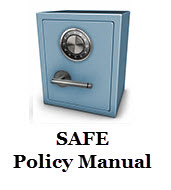|
|
State Accounting Fiscal Essentials . SAFE Policy Manual |
Revised: 04/14/2025 |
|
|
State Accounting Fiscal Essentials . SAFE Policy Manual |
Revised: 04/14/2025 |
Applicable or Related Code Sections
ORC Section 126.08 - Director of budget and management - powers and duties
ORC Section 126.21 - Accounting duties of director of budget and management
ORC Section 126.301 - Statute of limitations
ORC Section 126.37 - Stale warrants for payment
ORC Section 131.33 - Unexpended balances
![]()
This policy provides guidance on the recovery of payments made in error and clarifies the circumstances under which warrants voided for age are reissued and by whom.
This policy applies to all state agencies, boards, and commissions for expenditures made from funds within the state treasury.
Payments made in error, duplicate payments, or payments issued for the wrong amount or to the wrong payee must be stopped or canceled immediately.
If the payment was an electronic fund transfer (EFT), the agency must cancel the payment by completing the “Erroneous EFT Transmittal Form” and forward it to the Office of Budget and Management’s (OBM) Payment Issuance section.
The ability of OBM to cancel or recover EFT funds transmitted in error is dependent upon the timing of the request but may require additional steps should the request exceed 5 business days from the payment date. All other warrants must be stopped by completing “Stop Payment of Warrants Form,” and forwarding it to the OBM Payment Issuance section.
If a payee cashes an improper payment, then it is the agency’s responsibility to recover the funds. Dependent upon the situation, the recovery may generate a refund or credit. Credits may only be accepted by an agency if another invoice for services to relieve the credit within the same fiscal year is anticipated. If the credit is applied against a recurring obligation such as utilities, it can cross fiscal years if there is not a significant lapse in time from the original improper payment. A state agency shall not accept cash, a rain check, or agree to lower a future bill when receiving a credit from a merchant.
Refunds must be deposited as a refund of expenditure to the fund from which it was originally drawn. The refund must be issued from the payee who was erroneously paid, not a third party. Payee refunds deposited in the state treasury do not automatically update any Form 1099 reportable payments in OAKS. Special care must be taken to assure any refunds of payments initially to be reported on Form 1099 are processed correctly by notifying OBM Fiscal Support Services of needed adjustments or corrections.
Warrants that void for age are handled based on when the warrant was issued and when it voided for age. Agencies are responsible to reissue payments except in the following situations:
Warrant issued in one biennium and voids for age in the subsequent biennium; or
Warrant issued in the subsequent biennium from a prior biennium encumbrance and voids in that subsequent biennium.
The OBM Payment Issuance section is responsible for the reissue in these situations. When evaluating the responsible party to reissue a payment, consideration must be given as to which budget funded the warrant. Warrants funded with the operating budget have a biennium beginning in even-numbered years and those funded with the capital budget begin in odd-numbered years.
In situations where OBM Payment Issuance is responsible for reissuing the voided warrant, an agency must submit the “Claim for Reissuance of Voided Warrant due to Age” and the “Voided Warrant Certification.” Both forms are required as they provide assurances to OBM that the reissuance of the warrant is proper. For voided warrants reissued by the agency, the agency shall adopt internal procedures documenting assurances the reissuance of the payment is proper. At a minimum, an agency must reference the original voided voucher number as a comment in OAKS FIN when processing the reissuance, as well as add a comment to the original voucher to ensure the reissuance is not duplicated.
Appropriation is not restored to the agency when warrants are canceled after the end of the biennium. OBM has authority to transfer unencumbered, unexpended balances of an agency’s appropriations from the first fiscal year of a biennium to the second fiscal year of the same biennium to the extent necessary for voided warrants to be reissued. A request to transfer such appropriation must be made in writing by the agency in the OBM Director Requests Portal. The request must specifically list the warrants to be reissued, their amounts, the total request of appropriation to be transferred, and the reason for the reissuance. In situations where there is no appropriation authority, agencies must utilize unencumbered balances of current appropriations. In all situations, cash is restored to the fund from which the warrant was drawn.
Payments reissued by OBM are made using OBM appropriation authority and cash from the original funding source. An agency's fund cash balance will be reduced, but current year agency appropriation balances will not be affected. If the original fund has been closed or inactivated, OBM will contact the agency for the most appropriate funding source for cash purposes.
OBM recognizes ORC Section 126.301 in which the statute of limitations for an action against the state for a failure to make payment is five years, and OBM will not reissue a warrant beyond five years from the original warrant date. Agencies are required to reissue payments for which they are responsible within five years from the original warrant date. An agency has the discretion to reissue a warrant beyond five years from the original warrant date if they choose.
It is imperative that agencies maintain good records and establish internal procedures to prevent erroneous or duplicate payments. Agencies should always validate a payment voided or was cancelled prior to reissuance. A duplicate payment must never be processed knowingly, even if the original was lost, stolen, or destroyed.
